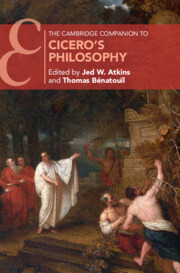Book contents
- The Cambridge Companion to Cicero’s Philosophy
- Series page
- The Cambridge Companion to Cicero’s Philosophy
- Copyright page
- Dedication
- Contents
- Contributors
- Preface
- Cicero’s Philosophical Works
- A Note on Abbreviations
- Introduction
- Chapter 1 Cicero’s Philosophical Writing in Its Intellectual Context
- Chapter 2 The Ciceronian Dialogue
- Chapter 3 Philosophy in Cicero’s Letters
- Chapter 4 Philosophy in Cicero’s Speeches
- Chapter 5 Cicero and the Creation of a Latin Philosophical Vocabulary
- Chapter 6 Cicero and Plato
- Chapter 7 Cicero’s Academic Skepticism
- Chapter 8 Cosmology, Theology, and Religion
- Chapter 9 Determinism, Fate, and Responsibility
- Chapter 10 Cicero on the Emotions and the Soul
- Chapter 11 Ethical Theory and the Good Life
- Chapter 12 Nature and Social Ethics
- Chapter 13 Philosophy, Rhetoric, and Politics
- Chapter 14 Cicero’s Republicanism
- Chapter 15 Empire, Just Wars, and Cosmopolitanism
- Chapter 16 Cicero and Augustine
- Chapter 17 Cicero and Eighteenth-Century Political Thought
- Chapter 18 Cicero and Twenty-First-Century Political Philosophy
- Bibliography
- Index of Cicero’s Texts
- General Index
- Series page
Chapter 16 - Cicero and Augustine
Published online by Cambridge University Press: 08 December 2021
- The Cambridge Companion to Cicero’s Philosophy
- Series page
- The Cambridge Companion to Cicero’s Philosophy
- Copyright page
- Dedication
- Contents
- Contributors
- Preface
- Cicero’s Philosophical Works
- A Note on Abbreviations
- Introduction
- Chapter 1 Cicero’s Philosophical Writing in Its Intellectual Context
- Chapter 2 The Ciceronian Dialogue
- Chapter 3 Philosophy in Cicero’s Letters
- Chapter 4 Philosophy in Cicero’s Speeches
- Chapter 5 Cicero and the Creation of a Latin Philosophical Vocabulary
- Chapter 6 Cicero and Plato
- Chapter 7 Cicero’s Academic Skepticism
- Chapter 8 Cosmology, Theology, and Religion
- Chapter 9 Determinism, Fate, and Responsibility
- Chapter 10 Cicero on the Emotions and the Soul
- Chapter 11 Ethical Theory and the Good Life
- Chapter 12 Nature and Social Ethics
- Chapter 13 Philosophy, Rhetoric, and Politics
- Chapter 14 Cicero’s Republicanism
- Chapter 15 Empire, Just Wars, and Cosmopolitanism
- Chapter 16 Cicero and Augustine
- Chapter 17 Cicero and Eighteenth-Century Political Thought
- Chapter 18 Cicero and Twenty-First-Century Political Philosophy
- Bibliography
- Index of Cicero’s Texts
- General Index
- Series page
Summary
This chapter aims to examine how Augustine appropriated Cicero’s philosophical thought. The first section studies the role of the Ciceronian protreptic Hortensius – the eudaimonism and the post-mortem destiny of the soul – in Augustine's philosophical project. The second analyzes the imprint of the philosophical dialogues of Cicero on Augustine’s early “Dialogues of Cassiciacum” (Contra academicos, De beata vita, De ordine, 386 ce); this influence is obvious in their literary genre and in the major philosophical topics they deal with (epistemology, ethics, providence). In his late masterpiece the City of God, Augustine discusses several Ciceronian notions (fate and foreknowledge; populus and respublica; passions) and translates them into a Christian framework: this is the focus of the third section. The last section outlines the evolution of Augustine’s judgment on Cicero, whom he considered a defender of the Neo-Academic position on the one hand, and, on the other, as a spokesman for Platonic philosophy.
- Type
- Chapter
- Information
- The Cambridge Companion to Cicero's Philosophy , pp. 252 - 267Publisher: Cambridge University PressPrint publication year: 2021

